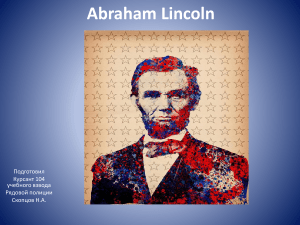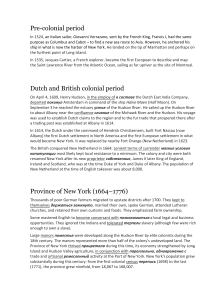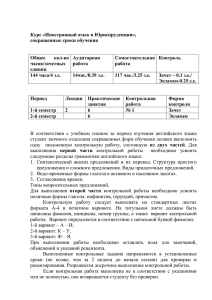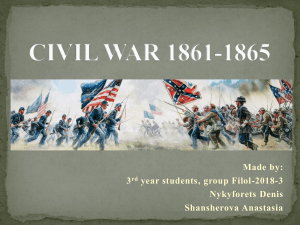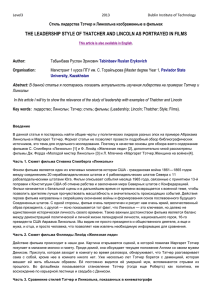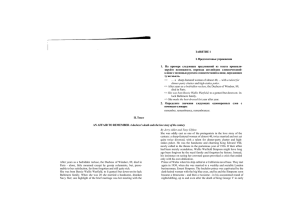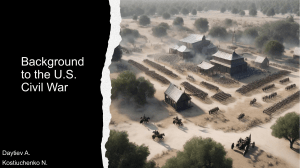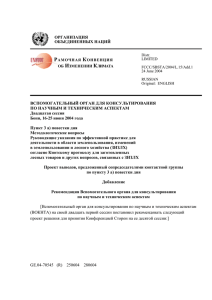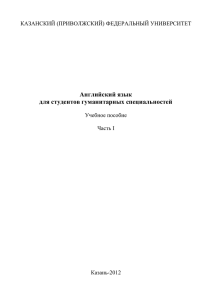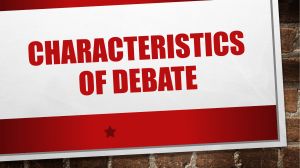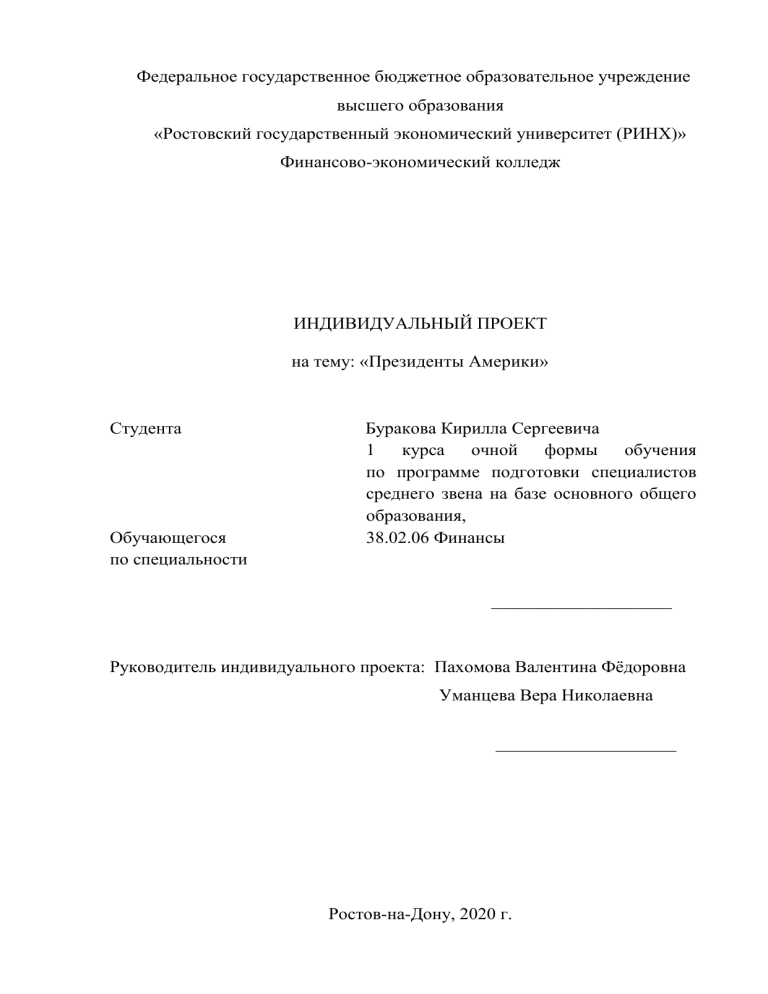
Федеральное государственное бюджетное образовательное учреждение высшего образования «Ростовский государственный экономический университет (РИНХ)» Финансово-экономический колледж ИНДИВИДУАЛЬНЫЙ ПРОЕКТ на тему: «Президенты Америки» Студента Обучающегося по специальности Буракова Кирилла Сергеевича 1 курса очной формы обучения по программе подготовки специалистов среднего звена на базе основного общего образования, 38.02.06 Финансы ____________________ Руководитель индивидуального проекта: Пахомова Валентина Фёдоровна Уманцева Вера Николаевна ____________________ Ростов-на-Дону, 2020 г. CONTENT С. INTRODUCTION 3 1 PRESIDENTIAL FORM OF GOVERNMENT OF THE UNITED STATES 5 1.1 General characteristics of the US presidency 5 1.2 Rights and duties of the President of the United States 9 1.3 The process of electing and assuming the office of President 11 2 THE MOST MEMORABLE PRESIDENTS OF THE UNITED STATES OF AMERICA 14 2.1 First President of the United States - George Washington 14 2.2 John F. Kennedy 16 2.3 Franklin Roosevelt 18 2.4 Ronald Reagan 19 2.5 Abraham Lincoln 21 2.6 Barack Obama 22 CONCLUSION 25 LIST OF SOURCES USED 26 2 INTRODUCTION The relevance of the chosen topic is explained by the significance of the US Presidential election, as well as the fact that understanding the American legal system is impossible without understanding the role played by the us Presidential election. The United States is the first country in the world where the institution of the presidency emerged as one of the most important institutions of the political system. Unlike other countries of the time, where there was a monarchical power, the United States began to elect the head of state in General elections. Later, some Latin American countries followed the example of the United States. And already in the first half of the XIX century. following the example of US legislation in many South American countries, the post of President was created. Currently, the Institute of the President exists in many countries. Meanwhile, despite the common features, the institution of the presidency differs in these countries, which is explained by the peculiarities of mentality, legal and national characteristics. Differences are also made in the order in which the President is elected to office. President - an elected head of state in countries with a Republican or mixed form of government; elected for a fixed term (for example, by the Constitution). Since 1789, the head of the American state, in whose hands the Executive power is concentrated, is the President. It has broad powers and influence over the entire state apparatus that exists in the United States. US presidents have always been one of the most influential people on the planet and made history not only for their country, but also for many others. Throughout the history of the United States, presidents have left their mark on American politics. However, until the twentieth century, they were often in the background, not actively participating in the decision-making process of Congress. Their policies usually did not have much impact outside the United States, and did not even matter much to most Americans. Since the presidency of F. D. Roosevelt (1933 3 1945), the role of presidential activity and the significance of the institution of the presidency itself have changed significantly. Purpose of research: consider the most memorable us Presidents. In the process of achieving this goal, a number of tasks were formed: - consider the General characteristics of the US presidency; - study the powers of the President; - get acquainted with some of the presidents of the United States. Object of research: President US. Subject of research: legal rules governing the election of the President of the United States. The structure of the work. This work consists of an introduction, two sections, eight paragraphs, conclusion, and a list of used sources from 7 titles. 4 1 PRESIDENTIAL FORM OF GOVERNMENT OF THE UNITED STATES 1.1 General characteristics of the US presidency The US President is the head of state of the United States, the chief Executive of the US Federal government and commander in chief of the Army and Navy under the Constitution of the United States. Has the right to veto bills (bills) passed by the US Congress. The position originated under the US Constitution, adopted in 1787. The first us President was George Washington. According to the us Constitution, only a US citizen by birth who is over 35 years old and has lived in the US for at least 14 years can become President of the United States. The oldest President at the time of election was Ronald Reagan, who was elected at the age of 68. According to the 22nd amendment to the Constitution, adopted in 1951, the same person can be elected President of the United States no more than twice (whether in a row or with a break). In addition, if a certain person after the death or resignation of the President-elect has held the presidential office (from the post of Vice-President or otherwise) for 2 years or more, then this person can be independently elected President no more than 1 time in the future. In fact, presidents have almost all followed this unwritten rule before, following the example of George Washington, who served only two terms in office. However, in 1940, Franklin D. Roosevelt was elected to a third term, and in 1944 to a fourth (died in 1945). After that, without detracting from the merits of Roosevelt and the extraordinary conditions in which he was re-elected (world war II), it was decided to limit the number of possible re-elections by law, so that this case would not become a precedent for the establishment of a dictatorship. The law was not retroactive and did not apply to the current President, Harry Truman, who had served almost all of Roosevelt's term after his death, plus his own, but Truman himself did not want to run again in 1952. 5 Only one President, Grover Cleveland, served two consecutive terms. The President of the United States is elected for a four-year term along with the Vice President through indirect (two-stage) elections. The so-called electoral College votes directly for the President and Vice President. Under the Constitution, the Legislature of each state can appoint a certain number of electors (equal to the number of state representatives in Congress) to represent the interests of the state. The method by which the list of electors is determined can be chosen by the Legislature at its discretion, however, currently, all States determine their electors by universal suffrage, which occurs on the first Tuesday after the first Monday in November each leap year. The voting of electors takes place in early January and is a known formality, although it has repeatedly happened that individual electors did not vote as promised when they were elected. In some States, there are laws that require electors to vote as the state dictates. The electors vote separately for the President and Vice-President. to be elected, the candidate must obtain an absolute majority (more than half) of the electors ' votes. If not, then the President or Vice-President elected by the House of representatives or the Senate of the U.S. Congress from among candidates with the highest number of electoral votes, according to the rules defined by the Constitution. If the President is removed from office, dies, resigns, or is unable to exercise his powers, the duties are transferred to the Vice President of the United States. The original text of the US Constitution was ambiguous and allowed as an interpretation, according to which the Vice President has only the powers and duties (that is, it becomes, relatively speaking, "acting President of the United States") and the interpretation that the Vice President receives the actual position. Since 1947, the law has been in force, according to which the President is replaced in his office by the following officials in this order: Vice-President, speaker of the house of representatives, first member of the Senate, Secretary of state, Minister of justice, Minister of defense, Minister of Finance. This list contains only 18 positions (there are conspiracy theories that there is a secret continuation of the list, num6 bering 50 or 100 names and calculated in the event of a nuclear war or a large-scale disaster; most experts are skeptical). The replacement procedure is limited by the condition that the person who assumes the office of President must be a U.S. citizen by birth on its territory and have lived in the United States for 9 years. The President is the commander-in-chief of the army and Navy of the United States and of the militia of individual States when called to active service by the United States. The President of the United States has the right to: - request an opinion in writing from the highest official in each of the Executive departments on any matter relating to their official duties; - grant a stay of execution, as well as a pardon for crimes against the United States, except in cases of impeachment (not only their own, but also officials of other levels); - to conclude international treaties with the advice and consent of the Senate, subject to their approval by two-thirds of the senators present; - fill all vacancies that occur between sessions of the Senate by issuing certificates for positions that expire at the end of its next session; - may call both houses of Congress, or any of them, in an emergency; - in the event of a disagreement between the houses of Congress over the time of adjournment, to adjourn the meeting itself for such time as it deems appropriate. The President of the United States, with the advice and consent of the Senate, appoints ambassadors, other officials and consuls, judges of the Supreme court, and all other U.S. officials whose appointments are not otherwise provided for in the Constitution and whose positions are established by law. The President periodically informs the Congress of the state of the country and recommends for its consideration such measures as it deems necessary and expedient. The President of the United States receives ambassadors and other official representatives, is required to ensure that laws are faithfully enforced, and certifies all United States officials in office. The Vice President of the United States is the second most important official in the Executive branch of the U.S. Federal government. Elected 7 together with the President of the United States, each candidate for the presidency has a "tie" candidate for the Vice-presidential position. Represents the same political party as the President. Formally heads the US Senate, has a number of other public duties. In case of death, resignation, or removal of the President of the United States becomes a full-fledged President of the United States (officially this provision is adopted only in 1967 as the 25th amendment to the Constitution; in fact, earlier VicePresident in such cases proclaimed by the President, although the provisions of the original text of the Constitution ambiguous and leave room for interpretation, according to which the Vice-President only becomes acting President). Until 1967, in the event of the Vice President's resignation or death or assuming the presidency, a new Vice President was not appointed, and the post remained vacant until a new election. Now, according to the same 25th amendment, there is a provision that in the event of a vacancy in this post, the us Congress must, on the proposal of the current President, appoint a new Vice President. This appointment occurred twice during 1973-1974. After the resignation of Vice President Spiro Agnew, Congress, on the recommendation of Richard Nixon, approved Gerald Ford as Vice President. After 8 months, Nixon resigned, Ford himself became President, and Congress approved Nelson Rockefeller as Vice President. The institution of the Vice presidency has been repeatedly criticized for the fact that a politician who is not elected as an independent candidate and is often little-known can suddenly become the head of state and drastically change the policy of the elected predecessor. On the other hand, there is a guarantee that the presidency will remain in the hands of the same party for a 4-year term. In some cases, the Vice President serves as President for a very short time. So, during Bush's colonoscopy, which was performed under anesthesia, Vice President Cheney took over the steering wheel. In the aftermath of the September 11, 2001, terrorist attack, Vice President Cheney often stayed in a secret location, which was allegedly done to prevent terrorists from trying to assassinate two top officials at the same time. 8 1.2 Rights and duties of the President of the United States The United States of America is a presidential Republic. Under this form of government, the role of the head of state is very great. It is endowed with great rights and opportunities, although its power, as in any democratic country, is limited by the legislative and judicial bodies. In this article, we will look at what the powers of the us President are, how he is elected, and what requirements must be met by candidates for this highest public office. Let's also compare the scope of rights of the Russian and American presidents. According to the Constitution, only a us citizen who was born in this country and has lived in it for at least 14 consecutive years can apply for the post of President. At the time of election, he must also live on the territory of the American state. The Constitution defines the lower age limit for a candidate. It is 35 years old. There is no upper limit on the legal age limit. The term of office of the us President is 4 years. This post can be held by the same person no more than twice, and it does not matter whether it is in a row or with a break. In addition to the requirements provided for by the Constitution, which must necessarily meet the applicant for the main position of the country in the United States, we can also highlight unofficial ones. The President must be a representative of one of the two leading American parties (democratic or Republican) and must be pre-elected by its members. A person who does not belong to any political structure, almost does not have the opportunity to take the position of head of state, although this is not prohibited by law and such precedents have occurred in the history of America. The moral character of a potential leader of a country is very important. Thus, having a strong family and several children significantly increases the chances of winning the election race. It is desirable for the future President to have an attractive appearance, good physical shape, good health, be cheerful and energetic. He should give voters the im9 pression of a strong, confident and charming person, of whom the American people could be proud, because the President represents the country on the international stage. He must not be publicly accused of lying. If it turns out that the candidate for the post of President did not tell the truth, it will reduce his chances of being elected to almost zero. As already mentioned, the head of the American state has a wide range of rights. The main powers of the us President are outlined in the Constitution. However, in reality they are much broader. In addition to legally established rights, there are also rights that are not indicated in the main document of the country, but are tacitly provided for, for example, due to the lack of relevant legislation. There are also powers delegated to the chief Executive by the legislature: 1. the President (with the consent of the Congress) appoints officials to the highest state posts. These are usually representatives of the same party to which he belongs. In the interval between sessions of Parliament, the President alone can appoint a person to a certain post, which he will hold until the end of the next session of the Congress. The procedure for dismissal is not prescribed by law, so the right to deprive a person of their position also belongs to the head of state, but his decision must be justified. The control powers of the President of the United States are manifested in the fact that he can request a written report from an official of any level on his activities; 2. the President is responsible for security in the country. He is the commander-in-chief of the army: the land forces and the Navy are under his command. In addition, all police officers are also subordinate to the President if they are called up for military service. Without having the right to declare war (this is the prerogative of the us Congress), however, the head of state can send troops to any country for up to three months, and after this time, ask permission from Parliament to continue fighting. It is also the President who has the right to impose a state of emergency in the country if necessary, as well as to cancel it; 10 3.the President of the United States has Extensive powers in the field of foreign policy. He represents the country on the world stage, conducts negotiations with heads of state and concludes international agreements, which, however, must be approved by 2/3 of the Congress. It is also the President who appoints those who will defend the interests of the United States in other countries (consuls, ambassadors, etc.) and will sit in international organizations; 4. the Congress, representing the legislative power in the country, is not subordinate to the head of state, but the latter has the right to call extraordinary sessions of the Parliament in case of domestic or foreign political emergencies. Moreover, the priority of choosing the date and time of such a meeting belongs to the President. The chief Executive also has the power of veto over any bill passed by Congress. They may not sign them and return them for revision or reject them completely. The President addresses regular messages to the Parliament. In them, he voices his political course - the direction in which the country should move; 5. the Powers of the President of the United States under the Constitution are also available in the field of the judicial system. It appoints Federal judges, although it needs congressional approval to do so. The President also has the right to grant pardons, amnesties and reprieves for persons who have committed state crimes. The only exception is cases involving impeachment, when the charge is made either to the leader of the country, or to someone from an official at any level. 6. The budgetary powers of the US President are that he provides to the Parliament the draft state. next year's budget. 1.3 The process of electing and assuming the office of President There are several stages of this process. First, the person who will run for the post of President is elected within the political party to which he belongs. This is called a primary. Since there are 2 main political parties in America (democratic and Republican), there are usually 2 presidential candidates as well. Each of them nominates a representative for the position of Vice-President, who must be approved by 11 the Congress. Candidates for the 1st and 2nd positions of the country go together throughout the election process. Then the most interesting thing begins. Candidates travel around the country, communicate with the people, agitate people, attract famous sports and show business figures, and arrange debates among themselves. In the United States, elections are two-stage and not direct, but indirect, that is, for a particular candidate, not directly citizens of the country cast their votes, but the so-called electoral College, which is created in all administrative districts. The members of this body are determined by the Legislature or chosen by the residents of each state from among the local most prominent public figures. The number of electors must correspond to the number of representatives of a particular state in Congress. The elections themselves are held in the first half of December. They vote separately for the President and Vice President. The winner in the election race is the candidate who has obtained an absolute majority, that is, more than half of the votes of all electors. If this does not happen and no candidate for the presidency receives the necessary number of votes, then the head of state is elected by the Congress. The President officially takes office on January 20, a month after his election victory. This time period is given to the newly elected head of state in order for him to have time to decide on the candidates of officials whom the Constitution requires to appoint. At the inauguration ceremony, the President takes an oath in which he promises to respect and protect the Constitution of the country, as well as faithfully perform his duties. The termination of the President's powers in the United States under the Constitution occurs not only after the natural end of the 4-year term for which he was elected, but also for other reasons: 1. Physical death (in the history of the United States, there were 4 presidents who died of natural causes-F. Roosevelt, Taylor, garrison, and Harding, and as many were killed - Kennedy, Lincoln, Garfield, and McKinley); 12 2. Resignation (assumes voluntary retirement from the presidential post). So far, only the only President, Nixon, has used this method, but he was forced to make this decision under the threat of impeachment; 3. removal from office by the Senate through impeachment proceedings. Such attempts have been made against several presidents (bill Clinton is the most famous and comparatively recent example), but none of them has been completed. The main reasons for suspension are serious criminal offences, bribery and state corruption. The house of representatives charges and collects evidence, and then passes the case to the Senate, which becomes a judicial body and makes a final decision (by a vote of its members) to terminate or resume the powers of the President of the United States. 13 2 THE MOST MEMORABLE PRESIDENTS OF THE UNITED STATES OF AMERICA 2.1 First President of the United States - George Washington George Washington first President of the United States. Although history presents him as the famous founding Father of the United States and a fighter against the tyranny of great Britain for the rights of the colonies, he remains a controversial figure in history. Some researchers claimed that he achieved fewer military victories than defeats. He was actively engaged in espionage and was a slave owner, although he did not approve of the institution of slavery. However, it is impossible to deny the influence of Washington on the course of history in the United States. This article briefly describes the biography of a prominent political figure in this country. George Washington was born in the colony of Virginia on February 22, 1732. His family was engaged in agriculture. Washington was home-educated and did a lot of self-education. He lost his father at an early age, and his half-brother tried to replace him. He later bequeathed the mount Vernon estate to the young man. Prior to this event, Washington had long worked as a surveyor. Then he became a militia member and soon received the rank of major. He fought against the French army and the Indians to expand the colony's land holdings. In 1753, he completed a complex assignment from the Governor of Virginia to deliver a message to the French troops. Due to inexperience, Washington almost died and failed the mission: on the way back, he was almost captured by the Indians. However, luck favored him: he was able to return and deliver a message to the Governor. In 1755, he participated in the storming of the Duker fortress, but was captured. After being released, he fought a second battle for which he was awarded the rank of Colonel. However, in 1758, he temporarily left the military service. 14 From 1758, Washington was elected to the Virginia legislature. He believed that great Britain restrained the industrial and commercial activities of the colonies. Together with like-minded people, he even organized an Association that boycotted English goods. By 1769, he had prepared a project that gave the colonies the right to selftaxation. After the «Boston tea party», when the British company's tea cargo was destroyed because of a protest, "Intolerable laws" were passed that strengthened the role of great Britain. Over time, the situation only worsened, despite the meetings of the continental congresses. Washington also took part in them. He was the first to defiantly change into a military uniform, realizing that a conflict with great Britain was inevitable. Thanks to past achievements, in 1775, he became commander-in-chief of the Continental army. Despite the complexity of completing the army, within a month after his appointment, he conducted the siege of Boston. A year later, he fought for new York, but was forced to surrender the city. However, later managed to take up at Trenton, Princeton, and Boston. Other important victories followed: the battle of Saratoga, the surrender of British troops at Yorktown, and the liberation of the Central States. Washington used not only military strategies, but also espionage. It allowed incorrect reports to fall into the hands of the British in order to misinform them. His spies reported the situation in the enemy's camp. Thanks to this, Washington could choose the right military strategy. In 1783, the Treaty of Paris was signed, which marked the end of the revolution. Washington resigned his office, leaving parting words in the government. However, Washington continued to be interested in the political situation of the country. He participated in the creation of the U.S. Constitution. and on April 30, 1789, Washington was unanimously elected President of the United States. To strengthen his influence, he worked with prominent politicians and economists, and introduced civil rights on legislative principles. He began building a new city and created a specially Federal district of Columbia that separated Virginia and 15 Maryland, so that the political views of the South and North would not lead to a clash. He believed that the US should not interfere in the politics of European countries. Therefore, the proclamation of neutrality was signed in 1793. With the Jay Treaty (of friendship, freedom of trade and navigation) in 1794, he averted the threat of a new confrontation with great Britain. Washington was twice re-elected President. In 1796, he wrote a parting letter to the American nation, urging them to maintain peace with other countries and observe religion and morality. George Washington married in 1759. His choice was the widow Martha Custis. Although the story of their family is presented as beautiful, still we can not exclude the possibility of this marriage for Washington. Martha Casteel was one of the wealthiest widows in Virginia and owned an estate with many acres of land and slaves. However, over time, their marriage really became filled with love and affection for each other. Thanks to Martha's fortune, Washington first traded tobacco, and later wheat, which doubled the family's income. They had no children, raising only Martha's children from a previous marriage. George Washington died in 1799. Before that, he took a walk around the estate, getting caught in the pouring rain. At home, he did not immediately take off his wet clothes, having been in them for some time. The next day, he had a fever and an inflamed throat. However, medicine in the XVIII century left much to be desired: the former President was treated with bloodletting and mercury chloride. Washington fell into a coma and died. He was buried at the mount Vernon estate. 2.2 John F. Kennedy John Fitzgerald Kennedy was born on may 29, 1917 in Dallas. He first attended the Dexter school, and after the family moved to new York in 1927, he entered the Riverdale Country school. The future President was not an excellent student. 16 At the age of 13, John entered Canterbury Catholic school. There he became interested in sports. The young Kennedy was particularly interested in athletics, as well as basketball and baseball. In 1935, the young man entered Harvard, but soon changed his mind to study there and sent documents to the London school of Economics and politics. Lectures were given there by Prof. G. Laski. Later, Kennedy went to Princeton University. In the summer of 1937 John went to Europe. There was his meeting with cardinal Pacelli. The journey had a strong influence on Kennedy's worldview. Impressed by the fascist regime in Italy and the national socialist regime in Germany, he wrote a work that soon became a separate book. The final title of the work is " Why England slept”. The book had a circulation of 80,000 copies. The young author received $ 40,000. John F. Kennedy began his political career under the influence of his father. At his request, D. M. Curley, a Massachusetts Congressman in the U.S. House of representatives, vacated his seat in favor of the young Kennedy. In 1947-1953 he Kennedy, a Congressman from the democratic party, represented the Boston district in Congress. In 1953, he became a Senator, beating his main rival for the seat, G. Lodge. During this time, the future head of the United States made several unexpected decisions. The most controversial was the refusal to investigate the “anti-American activities” of Senator D. McCarthy. In November 1960 John F. Kennedy was elected President. He was sworn in on January 20, 1961. The new President's administration includes individuals with connections in America's financial and monopoly circles, as well as experienced politicians. In particular, the administration included such personalities as L. Johnson, D. rusk, R. McNamara, R. Kennedy. The President donated his salary to charity. From 1960 to 1964, the United States GDP grew to $ 685 billion. The average annual inflation rate was 1%. Kennedy Jr. took a number of measures to combat unemployment and create new working conditions. The quality of training of qualified personnel has also been 17 improved. In 1961, the law on assistance to “depressed” areas of America was passed. In 1962, the law on retraining of those workers who were dismissed was published. The law on vocational education was adopted in 1963. In 1964, the program of food aid to the poor began to operate on a national scale. About 367,000 people received state food stamps. President Kennedy followed the model of A. Lincoln. He openly supported M. L. king. In 1963, they met. John F. Kennedy was assassinated on November 22, 1963, in Dallas. L. H. was arrested on suspicion of murdering the President. Oswald. 2 days later, the alleged killer was shot and killed by Dallas native D. ruby. «The avenger» also died in prison. 2.3 Franklin Roosevelt Born on January 30, 1882 in Hyde Park (new York). The heir to a rich old family that had already given America President T. Roosevelt, Franklin Delano was preparing for a political career from his youth. Received a law degree from Harvard and Columbia universities. He married a girl of his own class (1905). he Stubbornly fought his way to the White house: he was elected to the new York state Senate (1910), worked as an assistant Secretary of the Navy (1913-1920), and ran for Vice President from the democratic party. In the midst of this successful advance, Roosevelt was suddenly stricken with paralysis. He spent six years fighting the disease. In 1928, he appeared in front of voters in a wheelchair and won, becoming Governor of new York state. To citizens plunged into the depths of the great depression, the image of this politician spoke of the need to restore faith in their own strength. A brilliant speaker and journalist, Roosevelt turned to American history, arguing that the state can and should help everyone. It became a symbol of uniting Americans for the victory of the country, which will conclude a new social contract, or "new deal". One should, Roosevelt urged, "believe in America, believe in our tradi18 tion of personal responsibility, believe in our institutions, believe in ourselves — and accept the new terms of the old social contract." When Roosevelt took office in March 1933, America was crushed by a financial disaster and waiting for a revolution. Congress gave the head of state extraordinary powers, which the President did not have during the war. In the first 11 days, Roosevelt and his associates passed more legislation through Congress than in the previous 70 years since the Civil war. In 100 days, he created a comprehensive program of reforms to improve the economy-the "New deal". By the elections of 1936 Roosevelt led the United States out of the worst crisis in its history and was re-elected with 62 percent of the vote. In the next term, he passed the law on fair employment of labor and attacked the corporations that robbed the people, and after another re-election in 1940, he was forced to switch entirely to foreign policy. The Second world war began. America's tenacious neutrality towards the Italian and German authorities and Japanese militarism was shaken when the Germans entered Paris and began bombing London. After the Japanese attack on pearl Harbor on December 7, 1941 America has entered the war. Fighting with Japan and working with W. Churchill and I. V. Stalin in the anti-Hitler coalition, Roosevelt with his characteristic energy created a powerful military machine and provided his country with minimal losses, so that as a result of the war, the United States became the main and, as he hoped, the only winner. He died on April 12, 1945 in warm springs (Georgia). 2.4 Ronald Reagan Ronald Wilson Reagan was born on February 6, 1911 in Tampico, Illinois, the son of a poor Irish salesman. At school age, the boy showed an interest in sports and acting. At the age of 15, he found his first job as a lifeguard on the beach in the town of Dixon. He worked as a lifeguard for 7 consecutive years every summer, saving $ 20 a week for College. 19 In 1932, Reagan graduated from Eureka College, where he studied Economics and sociology. In College, he played sports and acted in the theater. After graduation, he began working as a sports commentator for a radio station in Davenport, later being hired by a major NBC station in Iowa. In 1937, Ronald's dream came true — he began a career as a film actor in Hollywood, the Warner brothers Studio offered the guy his first contract. He has appeared in more than 50 films. When world war II broke out, he joined a special air force unit based in Hollywood. Documentaries and educational films were made here, and since Reagan had poor eyesight, he was not allowed to go to the front. In the period 1947-1952, he served as President of the screen actors Guild. Reagan spoke less and less over the years, devoting more time to administrative work. His political career also started with radio stations, because he started his programs with a political review. It is worth noting that in the beginning, Ronald was a member of the us Democratic party. But in 1962, he switched to the Republican party. In 1964, he delivers the seminal "time to choose" speech in support of Barry Goldwater, a presidential candidate. After that, he was asked to run for the post of California Governor. It became Reagan in 1966. He was even re-elected Governor for a second term in 1970. In 1968 and 1976, he ran for President on behalf of the Republican party. But the attempts were unsuccessful. The desired position was obtained only in 1981. Thanks to his wise and balanced political activity, he was elected for a second term in 1984. The second presidential start was not as successful. At that time, Mikhail Gorbachev came to the post of President of the USSR, which changed the nature of Soviet-American relations. And the scandal over the illegal sale of weapons to Iran has overshadowed his presidency. He leaves office in 189 and settles on his estate in Los Angeles. In 1991, the Ronald Reagan Presidential library opened in Simi valley, California. In 1994, the former President was diagnosed with Alzheimer's disease and stopped appearing in public. For ten years, Reagan struggled with the disease and died on June 6, 2004. He was buried on the territory of the established library. 20 2.5 Abraham Lincoln American politician, 16th President of the United States. He was born on February 12, 1809 near the present city of Hodgenville (Kentucky) in the family of a farmer. in 1816, the family moved from Kentucky to Spencer County in southwestern Indiana, later-to Illinois. In 1834, he was elected to the Illinois house of representatives. In 1836, he was re-elected to a new term and became the Whig leader in the house of representatives. In the autumn of 1836, he received a license to practice law, and in March of the following year was officially admitted to the bar. In 1844, he founded his own law firm. After completing four terms in the Illinois house of representatives (1834-1842), he tried his hand at election to the house of representatives. He was defeated twice, but in 1846 he was elected as a member of the Whig party and served as a member of the house until March 4, 1849.in early 1855, the Illinois legislature almost elected Lincoln to the U.S. Senate. In mid-may 1860, the national Republican Convention was held in Chicago. Delegations from one state after another turned their eyes to Lincoln, and in the third round of voting, held on may 18, he was nominated as the party's presidential candidate. Lincoln did not actively campaign, but on election day, November 6, received 1,866,452 votes. Thus, Lincoln became a minority President, although he received 180 electoral votes against 123 votes cast for his rivals. The best expression of his concept of democracy and its significance for the world was the famous "Gettysburg address" - a brief speech at the opening of the military cemetery in Gettysburg, Pennsylvania, on November 19, 1863. By the end of Lincoln's first term as President, he had made many enemies, but they were not strong enough to prevent his nomination. Nevertheless, in the summer of 1864, even Lincoln himself assumed that he would be defeated in the election, because in the war of the North and South, the northerners were not lucky. The capture of Atlanta on September 1, 1864 restored the confidence of the North, and on No21 vember 8, Lincoln was elected to a new term, receiving 400,000 more votes than his rival, General J. McClellan. When Lincoln took the oath of office for the second time on March 4, 1865, it was clear that the war between the North and the South was nearing its end. On the evening of April 14, while visiting Ford's theater in Washington, he was shot by the actor J. Booth. Lincoln died without regaining consciousness on the morning of April 15, 1865. He was buried at oak ridge cemetery in Springfield on may 4, 1865. 2.6 Barack Obama The first black, 44th President of the United States of America was born on August 4, 1961. According to the European horoscope, a typical lion in the year of the Eastern Bull. So perseverance in achieving goals, he does not take up. He was born in Sunny Honolulu, the capital of the Hawaiian Islands. Imagine a very tall, good-looking, dark-skinned man weighing 90 kilograms. During his life, Barak has changed his place of residence more than once. Briefly leaving America, Hawaii, and returning there again. Baraka's father was from the African state of Kenya, and his mother was an American of European descent. They met while studying at a local University, where their father studied Economics and their mother studied anthropology. My father's education was paid for by the mission school. They were friends and introduced, oddly enough the Russian language. They really wanted to know the language of Pushkin and Tolstoy. So they both signed up for elective courses. In America, the President can easily publicly admit to the mistakes of youth such as Smoking weed, drugs and alcohol. He is not afraid that after these confessions, Americans will love him less. Barak successfully continues his education. First at Occidental College in Los Angeles, and then at the prestigious Columbia University. He finished it brilliantly in 1983. He receives a diploma and a bachelor's degree in political science. My major was in International relations. 22 A smart, capable, diligent student was invited to work for a large Corporation. Then he moved to the new York research center. Two years after graduation, he was offered a job as a lawyer in Chicago, and accepted the offer. He handled the Affairs of residents of poor areas of the city. But this was not enough for him. He decided to get a second higher education. His thirst for knowledge led him to Harvard law school. Barak was not only a student, but also the editor-in-chief of the Harvard law review. Before him, this post was not available to African-Americans. In the 90s, he joined the democratic party. And his rapid political career begins. To begin with, he is successfully running for Senator of the state of Illinois. The explosion of two skyscraper towers in new York on September 11, 2001 split politicians in two. One of them, in the person of George Bush, offered to immediately send troops to Iraq in response. Barack Obama was against this idea. As opposed to the North American free trade zone. In the social sphere, he supported low-income families. He proposed to introduce health insurance for all Americans. As a state Senator, he tried to unite the two parties – the Republican and the democratic. In 2000, he ran for the U.S. Federal Senate, but was unsuccessful. But, he is not a Bull for nothing according to the horoscope – he has a lot of persistence and perseverance. In 2005, he is running for the Senate again. This attempt was successful. "Should I take a swing at the presidency?" – decides Mr. Senator, and in 2007 stands for election. Hillary Clinton also ran for President as a Democrat. During the election race, she lost to Obama, but supported him during the election campaign. Barack Obama represented the interests of the middle class. They donated their savings to him. Nearly $ 60 million was raised. Barak's motto was: "Yes, we can." The main opponent-Republican John McCain (now deceased) represented the interests of the American elite. He won approximately 46% of the vote. But the peo23 ple chose a black President, with almost 53% of the vote. His assistant was a loyal friend and colleague, Joe Baden, who was a Delaware Senator. Barak began to implement his projects. Already in the first 100 days of his tenure as President, positive changes have been seen. He drew the attention of Congress to the infringement of women's rights in remuneration. Made a proposal to expand children's health insurance. Banks and car manufacturing have come to life with government funding. They also made a proposal to reduce taxes to trade unions and small entrepreneurs. Buying real estate has become profitable due to lower taxes. Work continued in the field of stem cell development. Research institutes and clinics received $3.5 trillion in government support. The soldiers were returning home to their families as the American withdrawal from Iraq began. In terms of foreign policy, attempts were made to establish relations with Europe and Iran, China and Russia, Cuba and Venezuela. The terrible prison at Guantanamo was closed, and a ban on physical abuse of prisoners was introduced. For these deeds, he received the Nobel peace prize in 2009. In the first year of his presidency, Barack Obama visited Russia, which was so far away for him. He considers the invasion of Libya by American troops to be his most unforgivable mistake. In 2011, he again successfully ran for President of America. In 2017, media Mogul Donald trump became the new 45th President. Barack Obama left the oval office of the White house. According to him, when asked: "What will he do next?", he modestly replied that he and his wife will help children in need to get an education. Barack Obama's personal life was very successful. He has a beautiful wife, Michelle, and two lovely daughters, Malia and Sasha. According to the wife, the future husband won her not with flowers and sweets, but with fiery speeches to troubled teenagers from poor neighborhoods of Chicago. Barak himself believes that the main thing in life is family. And you should never put it on the back burner for the sake of your career and personal ambitions. The work changes, and the family is given by God alone and for life. It is difficult to disagree with this statement. 24 CONCLUSION The president of the united states of Аmerica is the head and subject of the executive branch of the government, as well as the commander - in-chief of the united states armed forces. The Аmerican state is the first in history to establish this post on the basis of free choice. According to the constitution, a candidate must be a native Аmerican (i.e., a u.s. citizen by birth), be over 35, and have lived in the country for at least the past 14 years. The first President of the United States in history and the person who laid the foundations of the political system of the American state is George Washington. At one time, he participated in the Continental war and was a fighter for American independence, and for a long time served as commander-in-chief of the army. From the time of George Washington to the present day, American history has 44 people who have held this position. In total, American presidents have spent 57 presidential terms at the helm of the state. Eight presidents have died in office (four of them were assassinated – Abraham Lincoln, James Garfield, William Mckinley, and john f. Kennedy). Kennedy). Only one head of state voluntarily resigned (Richard Nixon left office due to the high probability of impeachment). 25 LIST OF SOURCES USED 1. The Constitution of the United States. - M.: Yurist, 2015. 2. Constitutional (state) law of foreign countries. Common part. Responsible editor B. A. Strashun. M., Bek, 2015. 3. Maklakov V.V. constitutions of foreign countries, textbook, Moscow, 2017. 4. Mishin A.A. Constitutional law of foreign countries, Moscow, 2016. 5. Chirkin V.E. Constitutional law of foreign countries, Moscow, 2015. 6. Yagur N.N. History of the state and law of foreign countries. Reader. - Meganewton. Theseus 2014 - 92c. 7. Yakushev A.V. Constitutional law of foreign countries. Course of lectures. M., «Prior», 2018. 26

